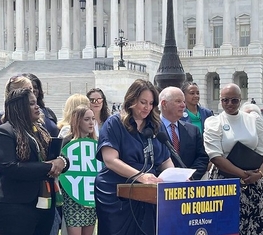LWV Florida v. Byrd (NVRA lawsuit)
Case Summary
LWV Florida and the Florida NAACP filed a lawsuit in federal court asserting Florida’s statewide voter registration form violated the National Voter Registration Act by failing to properly inform applicants with felony convictions of the additional requirements they must satisfy to vote.
The League of Women Voters of Florida (LWV Florida) and the Florida State Conference of the NAACP filed a lawsuit in the United States District Court for the Northern District of Florida, Tallahassee Division, arguing that Florida’s uniform statewide voter registration application form violated the National Voter Registration Act (NVRA). The NVRA requires states to inform applicants of eligibility requirements for voter registration and the penalties for submitting a false application.
In 2018, Florida voters enacted Amendment 4, which revised Florida’s constitution to automatically restore voting rights for citizens with felony convictions, except those convicted of murder or a felony sexual offense, upon “completion of all terms of sentence, including parole or probation.” Shortly thereafter, the Florida Legislature passed legislation that defined “completion of all terms of sentence” to include payment of all fines, fees, costs, and restitution (called legal financial obligations (LFOs)) imposed as part of the felony conviction.
LWV Florida and its partners filed a lawsuit asserting this requirement to pay before voting was unconstitutional. The provision on LFOs was subsequently upheld by the Eleventh Circuit Court of Appeals. Currently, there is no reliable public database or record for determining whether applicants owe money or have debts that disqualify them from voting, with numerous reports of confusion and uncertainty among citizens with felony convictions seeking to vote.
LWV Florida and its partners requested that the court declare that the statewide voter registration application form violated the NVRA, forbid its use, and replace it with one that fully detailed the requirements that applicants with felony convictions must satisfy before registering to vote. The current form does not explicitly state the exact conditions applicants with felony convictions must satisfy to vote. For example, as stated in the complaint, the current application fails to state that:
- For most felonies in Florida, returning citizens’ rights are automatically restored upon completion of all terms of their sentence, including probation, parole, or community control and payment of certain LFOs;
- Returning citizens convicted of murder or felony sexual offenses in Florida can only have their rights restored through the clemency process; or
- The voting rights of returning citizens convicted of felonies in states other than Florida are restored according to the law of the convicting state.
LWV Florida is represented by the ACLU Foundation of Florida, the Brennan Center for Justice, O’Melveny and Myers, the NAACP Legal Defense and Educational Fund, and the American Civil Liberties Union (ACLU).
LWV Timeline
Florida voters pass Amendment 4
Florida voters, by a 64% to 35% margin, vote to abolish lifetime disenfranchisement for felony convictions except for murder and felony sex crimes by amending the state constitution. The amendment automatically restores voting rights to all citizens convicted of felonies, except for those convicted of felony sex crimes and murder, upon “completion of all terms of sentence, including parole or probation.”
LWV Florida sends notice letter to Florida secretary of state
As required by the NVRA, LWV Florida and partners send a letter to Cord Byrd, the secretary of state of Florida, requesting he commit to issuing a new statewide voter registration application that properly informs applicants with felony applications of the requirements to vote.
LWV Florida files lawsuit
LWV Florida and its partners file a lawsuit in federal court, asserting the current statewide voter registration from violates the NVRA by failing to inform applicants with felony convictions of the conditions they were required to satisfy to vote.
Court grants motion to dismiss
The court grants defendant's motion to dismiss, ruling that Florida's voter registration forms need not specify the exact steps applicants with felony convictions must take to restore their voting rights. The order states that simply declaring applicants with felony convictions must have their voting rights restored before registering to vote satisfies the NVRA's requirements.





